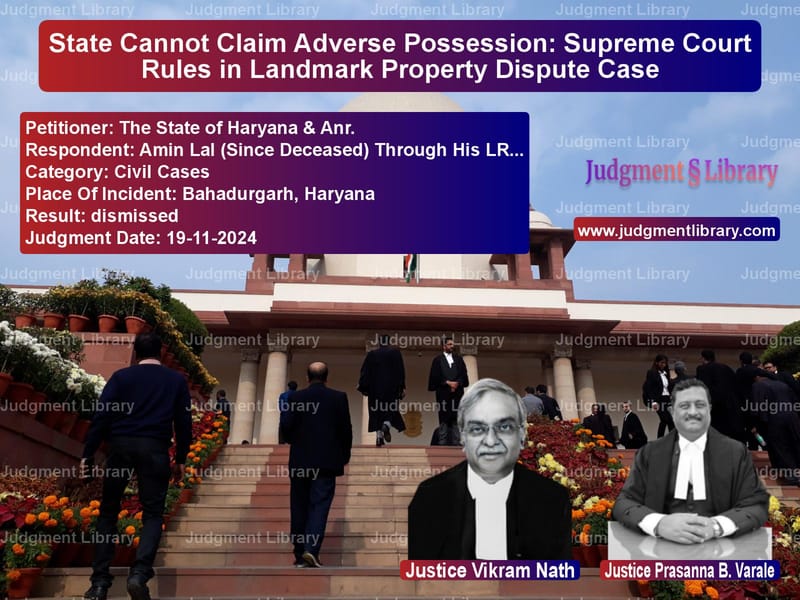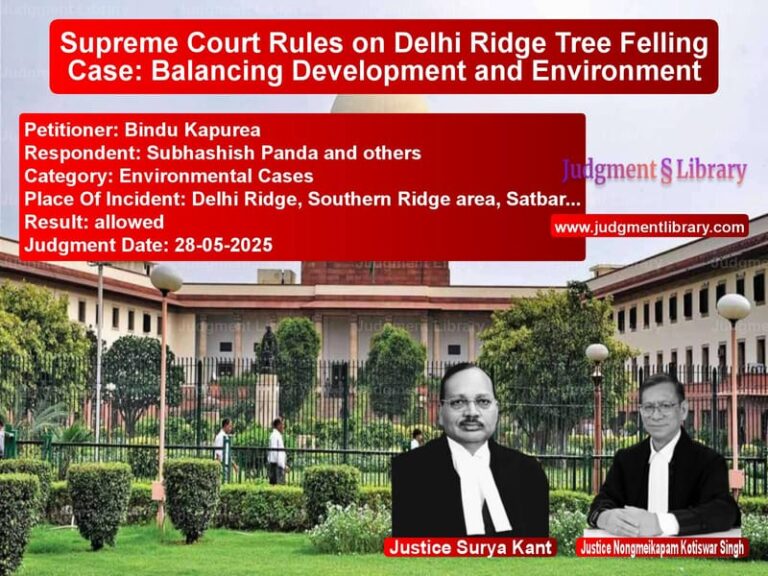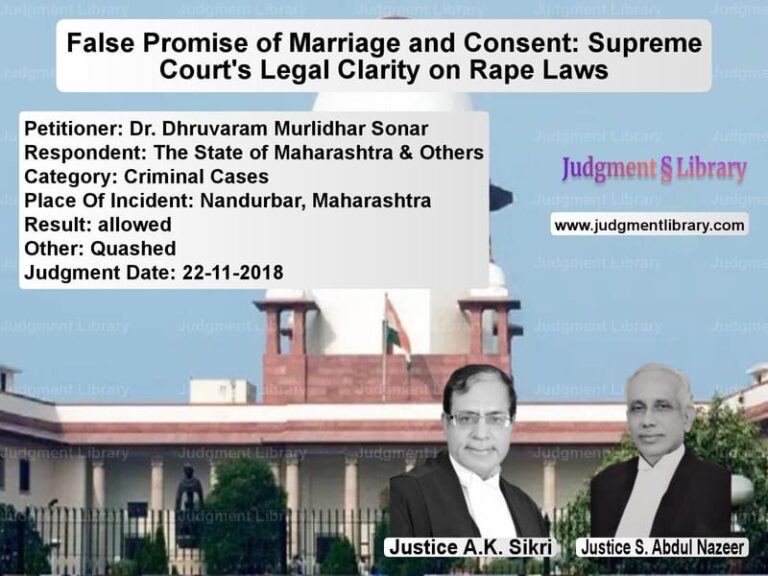State Cannot Claim Adverse Possession: Supreme Court Rules in Landmark Property Dispute Case
The case of The State of Haryana & Anr. vs. Amin Lal (Since Deceased) Through His LRs & Ors. revolves around a decades-old property dispute between private landowners and the state government. The core issue in the case was whether the State of Haryana could claim ownership of land based on adverse possession against private citizens. The Supreme Court ruled against the State, setting a significant legal precedent regarding government land acquisition and citizens’ property rights.
Background of the Case
The dispute centered on a piece of land measuring 18 Biswas Pukhta, situated in Bahadurgarh, Haryana, on both sides of National Highway No. 10. The plaintiffs, Amin Lal and Ashok Kumar, claimed ownership of the land based on revenue records and filed a suit for possession against the State of Haryana and the Public Works Department (PWD), alleging illegal occupation by the government.
According to the plaintiffs, the government had occupied the land without authorization for over three years before the suit was filed in 1981. They served a legal notice under Section 80 of the Code of Civil Procedure, 1908, but received no response. Consequently, they sought legal recourse for possession of their land.
Read also: https://judgmentlibrary.com/legal-interpretation-of-settlement-and-gift-deeds-in-property-disputes/
State’s Defense
The State of Haryana and PWD countered the plaintiffs’ claims by asserting that they had been in continuous possession of the land since 1879-80. They contended that their occupation was open, hostile, and adverse to the plaintiffs, thereby acquiring ownership through adverse possession. Additionally, the government claimed that the land had been used as a storage facility by the PWD and its predecessor entities for over a century.
Trial Court’s Findings
The Trial Court framed key issues for determination, including:
- Whether the State of Haryana had acquired ownership of the land by adverse possession?
- Whether the plaintiffs had legal standing to file the suit?
The Trial Court ruled in favor of the plaintiffs, stating that the State had failed to establish adverse possession. It observed that merely placing bitumen drums or constructing a boundary wall in 1980 did not amount to adverse possession. Since the plaintiffs were recorded as owners in revenue records, their claim to the land was upheld.
First Appellate Court’s Reversal
The State of Haryana challenged the Trial Court’s ruling before the District Judge, Rohtak. The First Appellate Court reversed the decision, holding that:
- The plaintiffs failed to provide sale deeds or mutation records proving ownership.
- Revenue records favoring the plaintiffs appeared manipulated.
- The State had been in continuous possession of the land since 1879-80, making its claim of adverse possession valid.
- The plaintiffs were attempting to encroach on government land through falsified documents.
High Court’s Decision
In response, the plaintiffs appealed to the Punjab & Haryana High Court, raising the following substantial questions of law:
- Can the State claim adverse possession against its citizens?
- Did the First Appellate Court err in its legal reasoning and appreciation of evidence?
The High Court ruled in favor of the plaintiffs, holding that:
- By claiming adverse possession, the State implicitly admitted the plaintiffs’ title.
- The government cannot acquire land from private individuals through adverse possession.
- The plaintiffs’ ownership was sufficiently established through jamabandi records.
- The First Appellate Court erroneously shifted the burden of proof onto the plaintiffs.
Supreme Court’s Analysis
The Supreme Court examined the following legal aspects:
1. Can the State Claim Adverse Possession Against Citizens?
The Court unequivocally held that the government cannot claim ownership of private property through adverse possession. The judgment cited Vidya Devi v. State of H.P., where the Court ruled that:
“The State cannot be permitted to take the plea of adverse possession, which allows a trespasser… to gain legal title over such property. The State being a welfare State, cannot be permitted to perfect its title over the land by invoking the doctrine of adverse possession.”
The Court emphasized that allowing the State to seize land through adverse possession would violate constitutional protections and undermine public trust.
2. Was the Plaintiffs’ Ownership Established?
The Supreme Court found that the plaintiffs had demonstrated ownership through registered sale deeds and mutation records. The Court noted that:
- The plaintiffs’ names were continuously recorded in jamabandi records.
- Revenue records serve as admissible evidence of ownership.
- The First Appellate Court’s finding that the plaintiffs manipulated records was speculative and unsubstantiated.
3. Was the Government’s Possession Adverse?
The Court ruled that the government’s possession of the land was permissive, not hostile. The Misal Hakiyat of 1879-80 described the occupation as conditional, meaning the government could not assert adverse possession. Additionally, placing bitumen drums or constructing temporary structures did not constitute adverse possession.
4. Did the High Court Exceed its Jurisdiction?
The Supreme Court rejected the State’s argument that the High Court overstepped its jurisdiction. The Court held that the High Court’s intervention was justified, as it had framed substantial questions of law regarding adverse possession and the burden of proof.
Supreme Court’s Verdict
The Supreme Court dismissed the appeal, upholding the High Court’s judgment. The key rulings included:
- The State cannot claim adverse possession against private citizens.
- The plaintiffs’ ownership was legally established.
- The First Appellate Court’s findings were legally flawed.
- The High Court was correct in restoring the Trial Court’s decision.
Accordingly, the Supreme Court reinstated the Trial Court’s decree in favor of the plaintiffs.
Conclusion
This landmark judgment reaffirms that the government cannot use adverse possession to seize private property. The ruling strengthens property rights and ensures that citizens are protected from unlawful government encroachment. The case underscores the importance of due process in property disputes and upholds the principle that the State must acquire land through lawful means rather than adverse possession.
Petitioner Name: The State of Haryana & Anr..Respondent Name: Amin Lal (Since Deceased) Through His LRs & Ors..Judgment By: Justice Vikram Nath, Justice Prasanna B. Varale.Place Of Incident: Bahadurgarh, Haryana.Judgment Date: 19-11-2024.
Don’t miss out on the full details! Download the complete judgment in PDF format below and gain valuable insights instantly!
Download Judgment: the-state-of-haryana-vs-amin-lal-(since-dece-supreme-court-of-india-judgment-dated-19-11-2024.pdf
Directly Download Judgment: Directly download this Judgment
See all petitions in Property Disputes
See all petitions in Landlord-Tenant Disputes
See all petitions in Specific Performance
See all petitions in Judgment by Vikram Nath
See all petitions in Judgment by Prasanna Bhalachandra Varale
See all petitions in dismissed
See all petitions in supreme court of India judgments November 2024
See all petitions in 2024 judgments
See all posts in Civil Cases Category
See all allowed petitions in Civil Cases Category
See all Dismissed petitions in Civil Cases Category
See all partially allowed petitions in Civil Cases Category







